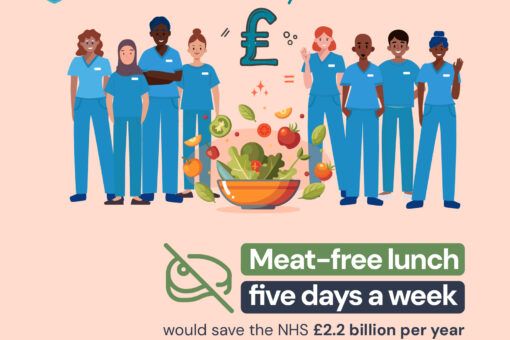
Food served in hospitals and healthcare institutions (such as the royal colleges, professional societies and commercial conferences) should contribute to the health of the people and not deteriorate it. However, despite the health harms of red meat and processed meat, these food products continue to be served in NHS hospitals and healthcare institutions to patients, staff and visitors. To build an NHS fit for the future it is essential to transform the food that is served in hospitals and healthcare institutions and make it healthy and sustainable.
In 2018-19 about 14 million kgs of unserved meals were thrown away from NHS hospitals in the UK. An estimated 39% of the annual food budget is lost due to hospital food waste (£230 million). But this is an underestimate as only 52 NHS trusts out of a total of 227 record their food waste data. Annual reporting of food waste needs to be undertaken by all healthcare institutes to help identify the total contribution and ways to reduce wastage. Dumping of food waste in landfills further contributes to GHG emissions, especially methane.
There have been many successful initiatives around the world where hospitals have set examples of how food can make both people and the planet healthy. For example, all public hospitals in New York, USA have been serving plant-based menus as the default option for their inpatients since March 2022, and apart from the health benefits it has led to a 36% reduction in carbon emissions, cost savings of $708,000 and >90% reported patient satisfaction. This is a ‘Greener by Default’ initiative which means making plant-based the default while giving diners the choice to opt into meat/dairy. It is a strategic practice that ensures freedom of choice is maintained and takes into account that patients with special dietary requirements are not restricted. In the UK, a study found more than 78% of inpatients were in favour of removing processed red meat from hospital food menus. A modelling study found that serving only meat-free meals in public catering could save the NHS £74 million a year and this saving can be increased to £2.2 billion per year if everyone had a meat-free lunch five days a week.
The UK Health Alliance on Climate Change has a list of 11 commitments outlined for healthcare institutions to demonstrate leadership by taking appropriate climate action. One of the commitments emphasises the need to prioritise plant-based and sustainably sourced foods. Healthcare institutions such as the Royal College of Emergency Medicine are leading the way in carving the pathway for a plant-based future by removing red meat and ensuring that a plant-based option (with the aim to increase such options) is always offered on all their menus. Furthermore, as healthcare organisations are increasingly committing to divest from fossil fuels it is imperative that they pledge to divest from the big meat industry. The top 5 meat companies together emit more greenhouse gases per year than the whole of the UK and Ireland combined.
